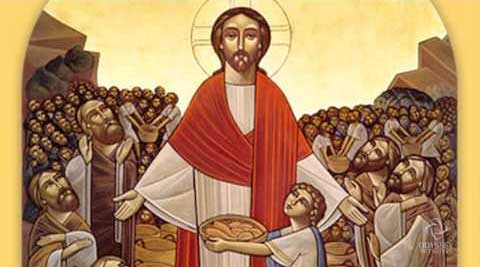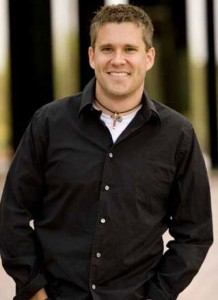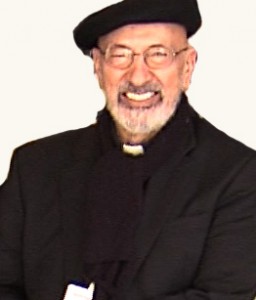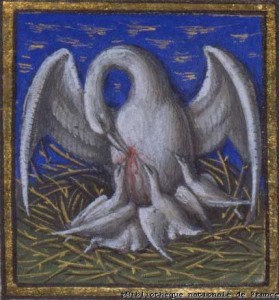The Sunday, Sunday, Sunday Podcast is a reflection on the upcoming Sunday Mass readings presented by LifeTeen.com and hosted by Mark Hart.
Gospel JN 6:51-58
“I am the living bread that came down from heaven;
whoever eats this bread will live forever;
and the bread that I will give
is my flesh for the life of the world.”The Jews quarreled among themselves, saying,
“How can this man give us his flesh to eat?”
Jesus said to them,
“Amen, amen, I say to you,
unless you eat the flesh of the Son of Man and drink his blood,
you do not have life within you.
Whoever eats my flesh and drinks my blood
has eternal life,
and I will raise him on the last day.
For my flesh is true food,
and my blood is true drink.
Whoever eats my flesh and drinks my blood
remains in me and I in him.
Just as the living Father sent me
and I have life because of the Father,
so also the one who feeds on me
will have life because of me.
This is the bread that came down from heaven.
Unlike your ancestors who ate and still died,
whoever eats this bread will live forever.”
Tags: catholic, catholic podcast, catholic prayer, cathollc spirituality, corpus christi
This entry was posted on Friday, June 20th, 2014 at 10:51 am
You can follow any responses to this entry through the RSS 2.0 feed.
Msgr. Esseff reflects on the teaching of Jesus found in John Chapter 6 for the great feast of Corpus Christi. Â He discusses the true presence of Jesus in the Eucharist. Â The tragedy becomes when we look upon the Blessed Sacrament has a “something” instead of a “Someone”.
From the NAB Â John Chapter 6
The Bread of Life Discourse.22* The next day, the crowd that remained across the sea saw that there had been only one boat there, and that Jesus had not gone along with his disciples in the boat, but only his disciples had left.23* Other boats came from Tiberias near the place where they had eaten the bread when the Lord gave thanks.24When the crowd saw that neither Jesus nor his disciples were there, they themselves got into boats and came to Capernaum looking for Jesus.25And when they found him across the sea they said to him, “Rabbi, when did you get here?â€26Jesus answered them and said, “Amen, amen, I say to you, you are looking for me not because you saw signs but because you ate the loaves and were filled.27Do not work for food that perishes but for the food that endures for eternal life,*which the Son of Man will give you. For on him the Father, God, has set his seal.â€l28So they said to him, “What can we do to accomplish the works of God?â€29Jesus answered and said to them, “This is the work of God, that you believe in the one he sent.â€30So they said to him, “What sign can you do, that we may see and believe in you? What can you do?m31* Our ancestors ate manna in the desert, as it is written:n
‘He gave them bread from heaven to eat.’†
32So Jesus said to them, “Amen, amen, I say to you, it was not Moses who gave the bread from heaven; my Father gives you the true bread from heaven.o33For the bread of God is that which comes down from heaven and gives life to the world.â€
34p So they said to him, “Sir, give us this bread always.â€35* Jesus said to them, “I am the bread of life; whoever comes to me will never hunger, and whoever believes in me will never thirst.q36But I told you that although you have seen [me], you do not believe.r37Everything that the Father gives me will come to me, and I will not reject anyone who comes to me,38because I came down from heaven not to do my own will but the will of the one who sent me.s39And this is the will of the one who sent me, that I should not lose anything of what he gave me, but that I should raise it [on] the last day.t40For this is the will of my Father, that everyone who sees the Son and believes in him may have eternal life, and I shall raise him [on] the last day.â€u
41The Jews murmured about him because he said, “I am the bread that came down from heaven,â€42and they said, “Is this not Jesus, the son of Joseph? Do we not know his father and mother? Then how can he say, ‘I have come down from heaven’?â€v43Jesus answered and said to them, “Stop murmuring* among yourselves.w44No one can come to me unless the Father who sent me draw him, and I will raise him on the last day.45It is written in the prophets:
‘They shall all be taught by God.’
Everyone who listens to my Father and learns from him comes to me.x46Not that anyone has seen the Father except the one who is from God; he has seen the Father.y47Amen, amen, I say to you, whoever believes has eternal life.48I am the bread of life.49Your ancestors ate the manna in the desert, but they died;z50this is the bread that comes down from heaven so that one may eat it and not die.51I am the living bread that came down from heaven; whoever eats this bread will live forever; and the bread that I will give is my flesh for the life of the world.â€a
52The Jews quarreled among themselves, saying, “How can this man give us [his] flesh to eat?â€53Jesus said to them, “Amen, amen, I say to you, unless you eat the flesh of the Son of Man and drink his blood, you do not have life within you.54Whoever eats* my flesh and drinks my blood has eternal life, and I will raise him on the last day.55For my flesh is true food, and my blood is true drink.56Whoever eats my flesh and drinks my blood remains in me and I in him.57Just as the living Father sent me and I have life because of the Father, so also the one who feeds on me will have life because of me.b58This is the bread that came down from heaven. Unlike your ancestors who ate and still died, whoever eats this bread will live forever.â€59These things he said while teaching in the synagogue in Capernaum.
Msgr. John A. Esseff is a Roman Catholic priest in the Diocese of Scranton. He was ordained on May 30th 1953, by the late Bishop William J. Hafey, D.D. at St. Peter’s Cathedral in Scranton, PA. Msgr. Esseff served a retreat director and confessor to Blessed Mother Teresa.   He continues to offer direction and retreats for the sisters of the missionaries of charity around the world. Msgr. Esseff encountered St.  Padre Pio,  who would become a spiritual father to him. He has lived in areas around the world,  serving  in the Pontifical missions, a Catholic organization established by Bl. Pope John Paul II to bring the Good News to the world especially to the poor. Msgr. Esseff assisted the founders of the Institute for Priestly Formation and continues to serve as a spiritual director for the Institute. He continues to  serve as a retreat leader and director to bishops, priests and sisters and seminarians and other religious leaders around the world.  Â
To obtain a copy of Msgr. Esseff’s book by visiting here
Be sure to visit Msgr. Esseff’s website “Building a Kingdom of  Love”
Tags: Blessed Sacrament, corpus christi, Jesus, John Esseff
This entry was posted on Sunday, June 2nd, 2013 at 8:54 am
You can follow any responses to this entry through the RSS 2.0 feed.
from Vatican Radio:
Did you know that the Feast of Corpus Christi was established during Saint Thomas’s lifetime? And that he probably wrote many of the prayers we use in the liturgy on this feast as well as some fine hymns in honour of the Blessed Sacrament.
But what is the connection with the pelican biting its breast , releasing drops of blood, to feed the young?
A programme presented by Monsignor Philip Whitmore and produced by Veronica Scarisbrick.
Tags: catholic, catholic podcast, catholic prayer, cathollc spirituality, corpus christi, feast of corpus christi, meditation, Monsignor Philip Whitmore, Saint Thomas, vatican radio, Veronica Scarisbrick
This entry was posted on Thursday, June 7th, 2012 at 12:11 am
You can follow any responses to this entry through the RSS 2.0 feed.
According to the Catholic Encyclopedia, the origins of Corpus Christi can be traced to St. Juliana of Mount Cornillon.
From Pope Benedict’s General Audience from vatican.va
Dear Brothers and Sisters,
This morning too I would like to introduce a female figure to you. She is little known but the Church is deeply indebted to her, not only because of the holiness of her life but also because, with her great fervour, she contributed to the institution of one of the most important solemn Liturgies of the year:Â Corpus Christi.
She is St Juliana de Cornillon, also known as St Juliana of Liège. We know several facts about her life, mainly from a Biography that was probably written by a contemporary cleric; it is a collection of various testimonies of people who were directly acquainted with the Saint.
Juliana was born near Liège, Belgium between 1191 and 1192. It is important to emphasize this place because at that time the Diocese of Liège was, so to speak, a true “Eucharistic Upper Roomâ€. Before Juliana, eminent theologians had illustrated the supreme value of the Sacrament of the Eucharist and, again in Liège, there were groups of women generously dedicated to Eucharistic worship and to fervent communion. Guided by exemplary priests, they lived together, devoting themselves to prayer and to charitable works.
Orphaned at the age of five, Juliana, together with her sister Agnes, was entrusted to the care of the Augustinian nuns at the convent and leprosarium of Mont-Cornillon.
She was taught mainly by a sister called “Sapienza†[wisdom], who was in charge of her spiritual development to the time Juliana received the religious habit and thus became an Augustinian nun.
She became so learned that she could read the words of the Church Fathers, of St Augustine and St Bernard in particular, in Latin. In addition to a keen intelligence, Juliana showed a special propensity for contemplation from the outset. She had a profound sense of Christ’s presence, which she experienced by living the Sacrament of the Eucharist especially intensely and by pausing frequently to meditate upon Jesus’ words: “And lo, I am with you always, to the close of the age†(Mt 28:20).
When Juliana was 16 she had her first vision which recurred subsequently several times during her Eucharistic adoration. Her vision presented the moon in its full splendour, crossed diametrically by a dark stripe. The Lord made her understand the meaning of what had appeared to her. The moon symbolized the life of the Church on earth, the opaque line, on the other hand, represented the absence of a liturgical feast for whose institution Juliana was asked to plead effectively: namely, a feast in which believers would be able to adore the Eucharist so as to increase in faith, to advance in the practice of the virtues and to make reparation for offences to the Most Holy Sacrament.
Juliana, who in the meantime had become Prioress of the convent, kept this revelation that had filled her heart with joy a secret for about 20 years. She then confided it to two other fervent adorers of the Eucharist, Blessed Eva, who lived as a hermit, and Isabella, who had joined her at the Monastery of Mont-Cornillon. The three women established a sort of “spiritual alliance†for the purpose of glorifying the Most Holy Sacrament.
They also chose to involve a highly regarded Priest, John of Lausanne, who was a canon of the Church of St Martin in Liège. They asked him to consult theologians and clerics on what was important to them. Their affirmative response was encouraging.
What happened to Juliana of Cornillon occurs frequently in the lives of Saints. To have confirmation that an inspiration comes from God it is always necessary to be immersed in prayer to wait patiently, to seek friendship and exchanges with other good souls and to submit all things to the judgement of the Pastors of the Church.
It was in fact Bishop Robert Torote, Liège who, after initial hesitation, accepted the proposal of Juliana and her companions and first introduced the Solemnity of Corpus Christi in his diocese. Later other Bishops following his example instituted this Feast in the territories entrusted to their pastoral care.
However, to increase their faith the Lord often asks Saints to sustain trials. This also happened to Juliana who had to bear the harsh opposition of certain members of the clergy and even of the superior on whom her monastery depended.
Of her own free will, therefore, Juliana left the Convent of Mont-Cornillon with several companions. For 10 years — from 1248 to 1258 — she stayed as a guest at various monasteries of Cistercian sisters.
She edified all with her humility, she had no words of criticism or reproach for her adversaries and continued zealously to spread Eucharistic worship.
She died at Fosses-La-Ville, Belgium, in 1258. In the cell where she lay the Blessed Sacrament was exposed and, according to her biographer’s account, Juliana died contemplating with a last effusion to love Jesus in the Eucharist whom she had always loved, honoured and adored. Jacques Pantaléon of Troyes was also won over to the good cause of the Feast of Corpus Christi during his ministry as Archdeacon in Lièges. It was he who, having become Pope with the name of Urban iv in 1264, instituted the Solemnity of Corpus Christi on the Thursday after Pentecost as a feast of precept for the universal Church.
In the Bull of its institution, entitled Transiturus de hoc mundo, (11 Aug. 1264), Pope Urban even referred discreetly to Juliana’s mystical experiences, corroborating their authenticity. He wrote: “Although the Eucharist is celebrated solemnly every day, we deem it fitting that at least once a year it be celebrated with greater honour and a solemn commemoration.
“Indeed we grasp the other things we commemorate with our spirit and our mind, but this does not mean that we obtain their real presence. On the contrary, in this sacramental commemoration of Christ, even though in a different form, Jesus Christ is present with us in his own substance. While he was about to ascend into Heaven he said ‘And lo, I am with you always, to the close of the age’ (Matthew 28:20)â€.
The Pontiff made a point of setting an example by celebrating the solemnity of Corpus Christi in Orvieto, the town where he was then residing. Indeed, he ordered that the famous Corporal with the traces of the Eucharistic miracle which had occurred in Bolsena the previous year, 1263, be kept in Orvieto Cathedral — where it still is today.
While a priest was consecrating the bread and the wine he was overcome by strong doubts about the Real Presence of the Body and Blood of Christ in the sacrament of the Eucharist. A few drops of blood began miraculously to ooze from the consecrated Host, thereby confirming what our faith professes.
Urban iv asked one of the greatest theologians of history, St Thomas Aquinas — who at that time was accompanying the Pope and was in Orvieto — to compose the texts of the Liturgical Office for this great feast. They are masterpieces, still in use in the Church today, in which theology and poetry are fuse. These texts pluck at the heartstrings in an expression of praise and gratitude to the Most Holy Sacrament, while the mind, penetrating the mystery with wonder, recognizes in the Eucharist the Living and Real Presence of Jesus, of his Sacrifice of love that reconciles us with the Father, and gives us salvation.
Although after the death of Urban iv the celebration of the Feast of Corpus Christi was limited to certain regions of France, Germany, Hungary and Northern Italy, it was another Pontiff, John xxii, who in 1317 re-established it for the universal Church. Since then the Feast experienced a wonderful development and is still deeply appreciated by the Christian people.
I would like to affirm with joy that today there is a “Eucharistic springtime†in the Church: How many people pause in silence before the Tabernacle to engage in a loving conversation with Jesus! It is comforting to know that many groups of young people have rediscovered the beauty of praying in adoration before the Most Blessed Sacrament.
I am thinking, for example, of our Eucharistic adoration in Hyde Park, London. I pray that this Eucharistic “springtime†may spread increasingly in every parish and in particular in Belgium, St Juliana’s homeland.
Venerable John Paul II said in his Encyclical Ecclesia de Eucharistia: “In many places, adoration of the Blessed Sacrament is also an important daily practice and becomes an inexhaustible source of holiness. The devout participation of the faithful in the Eucharistic procession on the Solemnity of the Body and Blood of Christ is a grace from the Lord which yearly brings joy to those who take part in it. Other positive signs of Eucharistic faith and love might also be mentioned†(n. 10).
In  remembering St Juliana of Cornillon let us also renew our faith in the Real Presence of Christ in the Eucharist. As we are taught by the Compendium of the Catechism of the Catholic Church,“Jesus Christ is present in the Eucharist in a unique and incomparable way. He is present in a true, real and substantial way, with his Body and his Blood, with his Soul and his Divinity. In the Eucharist, therefore, there is present in a sacramental way, that is, under the Eucharistic Species of bread and wine, Christ whole and entire, God and Man†(n. 282).
Dear friends, fidelity to the encounter with the Christ in the Eucharist in Holy Mass on Sunday is essential for the journey of faith, but let us also seek to pay frequent visits to the Lord present in the Tabernacle! In gazing in adoration at the consecrated Host, we discover the gift of God’s love, we discover Jesus’ Passion and Cross and likewise his Resurrection. It is precisely through our gazing in adoration that the Lord draws us towards him into his mystery in order to transform us as he transforms the bread and the wine.
The Saints never failed to find strength, consolation and joy in the Eucharistic encounter. Let us repeat before the Lord present in the Most Blessed Sacrament the words of the Eucharistic hymn “Adoro te devoteâ€: [Devoutly I adore Thee]: Make me believe ever more in you, “Draw me deeply into faith, / Into Your hope, into Your loveâ€.
Thank you.
Tags: catholic, catholic podcast, catholic prayer, cathollc spirituality, corpus christi, feast of corpus christi, feast of the blessed sacrament, saint augustine
This entry was posted on Wednesday, November 17th, 2010 at 5:33 pm
You can follow any responses to this entry through the RSS 2.0 feed.





